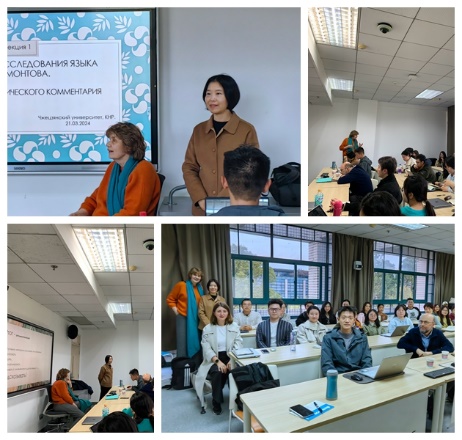On the afternoon of March 21, 2024, the 32th Qizhen Lecture on Russian Literature, one of a series of lectures, was held successfully at Room 302 of East Building 1A on Zijingang Campus, by the Institute of Russian Language and Culture at School of International Studies, Zhejiang University. The lecture, entitled ”A Corpus-based Study of the Language of Lermontov’s Poetry”, was delivered by Prof. Ekaterina Rakhilina, member of Academia Europaea, expert in cognitive linguistics, lexicology and corpus linguistics. Moderated by Prof. WANG Yong from the Institute of Russian Language and Culture, the lecture attracted many students of all grades majoring in the Russian language and teachers from the Institute.
After a brief introduction to the main points of the lecture, Prof. Rakhilina asked three questions about the evolution of language: “How fast does language displacement occur?” “How widespread is the language displacement?” “How complete is the displacement of language?” . In the course of the elaboration, Prof. Rakhilina introduced the linguistic experiments she is currently working on, i.e., taking the traditional classics, which predate modern literature by two centuries, as research material, she converted them into modern Russian and labeled them with the changes that require the replacement of linguistic units, linguistic structures, etc. With the help of NCSR (the National Corpus of the Russian Language), RLC (Russian Learner Corpus), КРУТ (Корпус русских учебных текстов) and other corpora, she further precised the semantics and thus provided an initial answer to the above three questions. Though meticulous analysis of the semantic displacement of the words “имя”, “следить”, “выходка”, etc. in the last chapter “Fatalist” of Lermontov’s novel Heroes of Our Time, Professor Rakhilina presented us with the variable and complex evolutionary trajectory of Russian vocabulary and drew negative conclusions, e.g., the Russian language has changed dramatically over the course of two centuries and modern native speakers of Russian do not accurately understand 19th-century Russian texts. Additionally, she foresaw future research for linguists to predict the trajectory of language evolution by recording, measuring and systematizing the phenomenon of language displacement.
During the Q&A session, students and teachers engaged with Prof. Rakhilina on various topics, including the evolution of geographical terms, the innovation of language evolution research and the Chinese translation of Russian classics. At the end of the lecture, Prof. WANG Yong summarized the main points of the lecture in pithy and vivid terms, expressed her gratitude to Prof. Rakhilina for her wonderful lecture and insights and linked the study of language evolution to the study of literature, providing students with a new horizon for their future literary studies.
Photos: LI Yuyao
Text: JIN Min
Institute of Russian Language and Culture
March 23, 2024
Translated by TIAN Ran, Proofread by XU Xueying




